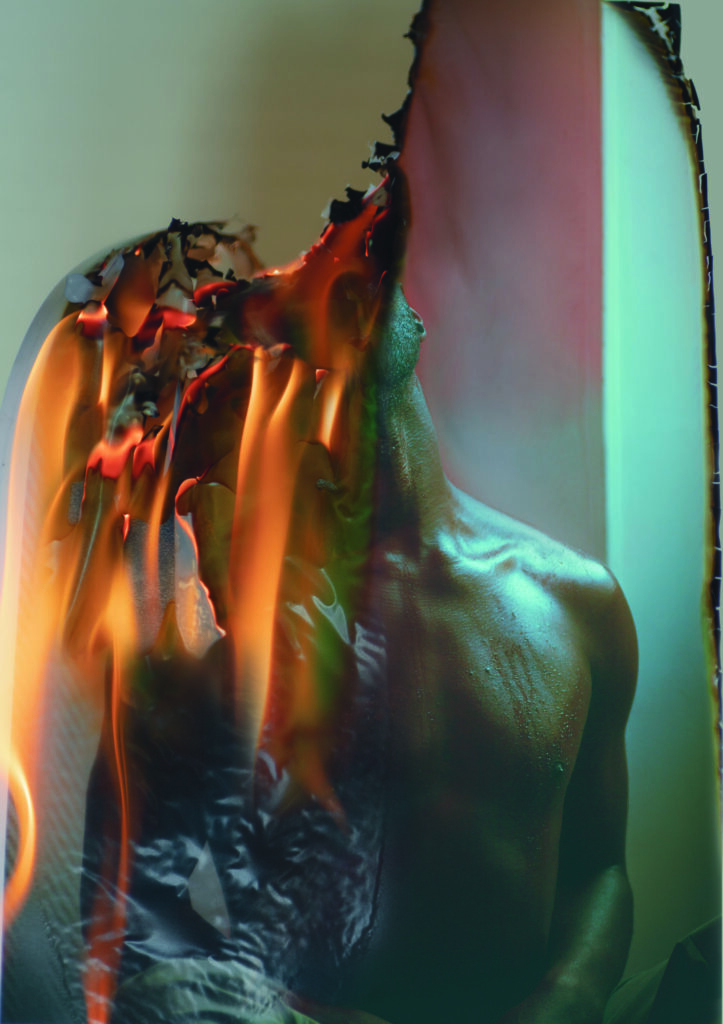Editor’s Note
In Palestine, Sudan, Congo, and beyond, communities endure genocide, occupation, and state violence rooted in the ongoing machinery of colonialism and empire. These realities demand that literature serve as witness and resistance. This issue of The New Orleans Review gathers work that refuses silence, insists on memory, and imagines futures beyond authoritarian control.
Our cover image, Le Feu Brûle by Prisca Munkeni Monnier, embodies this vision. Raised in Congo and South Africa and now based in France, Monnier works across photography, performance, and hybrid materials to preserve memory when archives falter. Fire, distortion, and natural elements become her language for confronting erasure, holding destruction and survival in the same frame.
Among our features are interviews with Amel Khalil, a Palestinian American actor, writer, and strategist who speaks to storytelling as resistance, and Lisa Sanaye Dring, writer and director, whose reflections on theater and on sumo as ritual insist that performance can hold both vulnerability and defiance against the binaries of capitalism.
In poetry, Hanaa Ibrahim, raised in Gaza and now based in the US, transforms inherited loss into fierce lyric reclamation. And alongside this, Alexa Doran’s “relapse” turns the gaze inward, charting the looping patterns of addiction and desire. Her poem reminds us that survival is not only collective but also private and bodily—that the same forces that silence nations can also reverberate in the most intimate struggles of the self.
Much of our fiction this issue was chosen exclusively by our undergraduate student interns, including Chris Wu’s “Complications,” Madeleine Hollis’s “Cetacean Stranding,” and Chris Seaborne’s “A Flicker on the Grid”—each of which traces questions of intimacy, fracture, and survival in distinctly inventive ways. Alongside these, Winston Turnage’s “Throatfish” pushes into the surreal to confront trauma, perception, and the deep human need to be understood, while Kasey Buckley’s “Inheritance” turns to the Gulf Coast to unpack the weight of family legacy and the marks of class, memory, and survival. What emerges across them is a reminder that even the most intimate encounters carry the weight of history and power.
And in nonfiction, Stevie Chedíd’s essay “No Exceptions” circles local folklore only to return us to the larger questions of belonging, genocide, and whose memories are allowed to endure.
What unites these works is their insistence that art is not escape but witness, not ornament but survival. Chosen from more than 15,000 submissions, they are only a small glimpse into this issue. They remind us that literature must stand against the forces of colonialism, capitalism, and white supremacy—forces that seek to silence, erase, and consume. May these works serve as nourishment, clarity, and companionship in a time that demands courage.
In solidarity,
Lindsay Sproul
Editor-in-Chief
Art
“Le Feu Brûle” by Prisca Munkeni Monnier
“Re-Stitch the Past: Reviving the Thread of Erased Palestinian Villages” by Tasnim Al wa’l
Interviews
Amel Khalil by Briana Bhola
Lisa Sanaye Dring by Marigny Beter
Fiction
“Inheritance” by Kasey Buckley
“throat fish” by Winston Turnage
“Complications” by Chris Wu
“Cetacean Stranding” by Madeleine Hollis
“A Flicker on the Grid” by Chris Seaborne
Poetry
“[now that there is a cum rag I curl” & “relapse” by Alexa Doran
“Into Myself” by Kristi Maxwell
“Refuge(e)” & “Farewell” by Hanaa Ibrahim
“Thread” by Liz Femi
“Personas” by Irsa Hassan
“we were there at the slaughter” by Chii Ọganihu
“Fidelity of Swans” & “Saint Patrick’s Cattle” by Kathleen Winter
“My Great-Grandmother Continues to Speak in a Tangled River of Greek” by Caroline Laganas
“Self-Portrait With a Magician” by Konstantinos Patrinos
“Blue dementia” by Gabriel Awuah Mainoo
“Flamingos Dance at Midnight” & “Storm Chaser” by Lauren Kalstad
“feint & burrow” by Linda Michel-Cassidy
“My mother tells me not to walk alone in the forest, so I drop my location on a pin” & “Before He Duct-Taped his Million-Dollar Banana to a Wall, Mauritzio Cattelan Made ‘Daddy, Daddy” by Lizzy Ke Polishan
“blood pact” by Gwen Aube
“Mares I” by Alessandra Occhiolini
“OPINIONS ON THE BAGGY 2 TIGHT PIPELINE?” by Michelle Lin
Nonfiction
“No Exceptions” by Stevie Chedid
“A Clear Day for Bombs” by Jean McDonough
“You Go, I Go” by Scott Rosario Mottola

